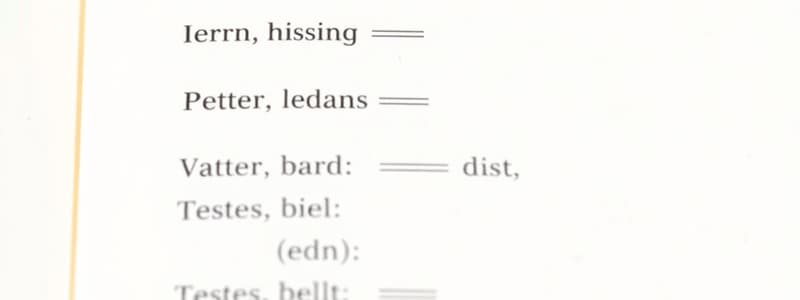Podcast
Questions and Answers
Глаголы описывают действия, состояния бытия или события.
Глаголы описывают действия, состояния бытия или события.
True (A)
Существует только два времени глагола: настоящее и прошедшее.
Существует только два времени глагола: настоящее и прошедшее.
False (B)
Связующие глаголы соединяют подлежащее с существительным, прилагательным или описательной фразой.
Связующие глаголы соединяют подлежащее с существительным, прилагательным или описательной фразой.
True (A)
Все глаголы следуют предсказуемым шаблонам спряжения.
Все глаголы следуют предсказуемым шаблонам спряжения.
Модальные глаголы выражают способность, возможность, разрешение и обязательство.
Модальные глаголы выражают способность, возможность, разрешение и обязательство.
Flashcards
Глагол
Глагол
Слово, описывающее действие, состояние или событие.
Вид глагола
Вид глагола
Глаголы делятся на: глаголы действия (run), связочные глаголы (appear) и вспомогательные глаголы (am, is, are).
Наклонение глагола
Наклонение глагола
Выражает отношение или намерение, например, утверждение факта, команда или гипотетические ситуации.
Время глагола
Время глагола
Signup and view all the flashcards
Согласование подлежащего и сказуемого
Согласование подлежащего и сказуемого
Signup and view all the flashcards
Модальные глаголы
Модальные глаголы
Signup and view all the flashcards
Фразовые глаголы
Фразовые глаголы
Signup and view all the flashcards
Глагольные формы
Глагольные формы
Signup and view all the flashcards
Глагольный залог
Глагольный залог
Signup and view all the flashcards
Вспомогательные глаголы
Вспомогательные глаголы
Signup and view all the flashcards
Глагольная фраза
Глагольная фраза
Signup and view all the flashcards
Study Notes
Verbs: Overview
- Verbs are words that describe actions, states of being, or occurrences.
- They are crucial for forming complete sentences, as they typically express what the subject is doing or is.
- Verbs come in various forms, including base forms, past tense, past participle, and present participle.
Verb Tenses
- Verb tenses convey the timeframe of an action or state of being.
- Common tenses include present simple, present continuous, present perfect, past simple, past continuous, past perfect, future simple, future continuous, and future perfect.
- Each tense has specific uses and grammatical structures.
Verb Types
- Action verbs: Describe physical or mental actions (e.g., run, think, eat).
- Linking verbs: Connect the subject to a noun, adjective, or other descriptive phrase (e.g., be, become, seem, appear).
- Helping verbs/Auxiliary verbs: Assist the main verb in forming tenses, moods, or voices (e.g., am, is, are, was, were, have, has, had, will).
Verb Conjugation
- Verbs change their form to reflect different grammatical functions (e.g., tense, number, person).
- Conjugation patterns vary significantly between different English verbs.
- Regular verbs follow predictable patterns, while irregular verbs have unique forms for different tenses.
Verb Voice
- Verb voice indicates whether the subject performs the action (active voice) or receives the action (passive voice).
- The passive voice often uses the verb "to be" plus the past participle of the main verb.
Verb Mood
- Verb mood indicates the attitude or intention expressed by the verb.
- Common moods include indicative (statements of fact), imperative (commands), and subjunctive (hypothetical situations or suggestions).
Verb Phrases
- Verb phrases consist of a main verb and one or more auxiliary verbs.
- They are used to depict various shades of meaning and grammatical complexity.
Verb Agreement
- Subject-verb agreement requires the verb to match the number (singular or plural) of the subject.
- This principle is crucial for maintaining grammatical correctness.
Modal Verbs
- Modal verbs (e.g., can, could, should, would, may, might, must) express ability, possibility, permission, obligation, or advice.
- They are always followed by a base form of the main verb.
Phrasal Verbs
- Phrasal verbs are verbs combined with prepositions or adverbs that convey idiomatic meanings.
- Their meanings often differ significantly from their individual components.
Verb Complements
- Verb complements provide the object or prepositional phrase that completes the verb's meaning.
- They can be nouns, pronouns, adjectives, or clauses.
Verb Participles
- Present participles (e.g., -ing form) and past participles (e.g., -ed form) are verb forms used in various grammatical structures, such as present participial phrases, perfect tenses, and passive voice.
Studying That Suits You
Use AI to generate personalized quizzes and flashcards to suit your learning preferences.




